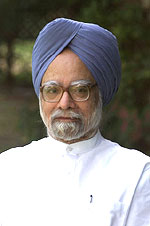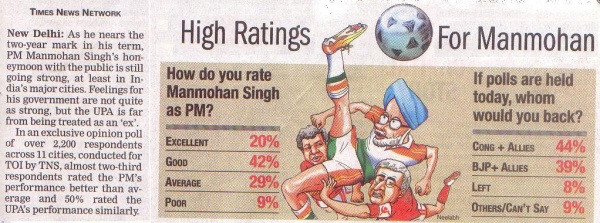Dr Manmohan Singh
Manmohan Singh (Punjabi: ਮਨਮੋਹਨ ਸਿੰਘ, born 26 September 1932) is the 14th and current Prime Minister of the Republic of India. He is the first Indian Prime Minister since Jawaharlal Nehru to return to power after completing a full five-year term. He is also the first Sikh to hold the post.
Earlier, during his tenure as the Finance Minister from 1991 to 1996, Singh was widely credited for carrying out economic reforms in India in 1991 which resulted in the end of the infamous Licence Raj system and the opening up of the Indian economy.
Prime Minister Manmohan Singh was born in the village of Gah in the Punjab province that was, at the time, part of India. Dr. Singh completed his Matriculation examinations from the Punjab University in 1948. His academic career took him from Punjab to the University of Cambridge, UK, where he earned a First Class Honours degree in Economics in 1957.
Childhood and education
Manmohan Singh was born to Shri Gurmukh Singh and Amrit Kaur on 26 September 1932, in Gah, Punjab (now in Chakwal District, Pakistan), British India, into a Sikh family. He lost his mother when he was very young, and he was raised by his paternal grandmother, with whom he was very close. He was a hard working student who studied by candlelight, as his village did not have electricity.
After the Partition of India in 1947, he migrated to Amritsar, Punjab, India. He went on to attend Punjab University, Chandigarh. Studying Economics, he attained his bachelor's and master's degrees in 1952 and 1954 respectively. Standing first throughout his academic career, hShrie went on to read for the Economics Tripos at Cambridge University as a member of St John's College. (In the Oxbridge tradition, holders of the BA degree with honours are entitled in due course to an MA degree.) He won the Wright's Prize for distinguished performance in 1955 and 1957. He was also a recipient of the Wrenbury Scholarship in Political Economy.
In 1962, Singh completed his DPhil from the University of Oxford where he was a member of Nuffield College. The title of his doctoral thesis was "India’s export performance, 1951-1960, export prospects and policy implications", and his thesis supervisor was Dr I M D Little. From this thesis he published the book "India’s Export Trends and Prospects for Self-Sustained Growth".[4]
Honorary Degrees
- Highlights
In 1997, the University of Alberta presented him with an Honorary Doctor of Laws. The University of Oxford awarded him an honorary Doctor of Civil Law degree in June 2006, and in October 2006, the University of Cambridge followed with the same honour. St. John's College further honored him by naming a PhD Scholarship after him, the Dr Manmohan Singh Scholarship.
- An Ever Growing List
Recipient of honorary degrees of D. Litt. from Panjab University, Chandigarh, Guru Nanak University, Amritsar, Delhi University, Delhi, Sri Venkateshwara University, Tirupathi, Punjabi University, Patiala, University of Mysore, Mysore, University of Bologna, Italy, Kurukshetra University, Kurukshetra, Osmania University, Hyderabad, Nagarjuna University, Nagarjunanagar and Dr. Bhimrao Ambedkar University, Agra; recipient of honorary degree of (i) Doctor of Laws from University of Alberta, Edmonton, Canada, (ii) Doctor of Social Sciences from University of Roorkee, Roorkee, (iii) D.Sc. from Chaudhary Charan Singh Haryana Agricultural University, Hissar, (iv) Thapar Institute of Engineering and Technology, Patiala, (v) H.H. Kanchi Sri Parmacharya Award for Excellence, 1999 and (vi) Annasaheb Chirmule Award, 2000; Conferred, (i) University Medal for standing first in B.A.(Hons.), Economics, Panjab University, Chandigarh, 1952, (ii) Uttar Chand Kapur Medal, Panjab University, Chandigarh, for standing first in M.A.(Economics), 1954, (iii) Wright's Prize for distinguished performance at St. John's College, Cambridge, 1955 and 1957, (iv) Adam Smith Prize, University of Cambridge, U.K., 1956, (v) Padma Vibhushan, 1987, (vi) Euromoney Award, Finance Minister of the Year, 1993 (vii) Asiamoney Award, Finance Minister of the Year for Asia, 1993 and 1994, (viii) Jawaharlal Nehru Birth Centenary Award of the Indian Science Congress Association, 1994-95, (ix) Justice K.S. Hegde Foundation Award, 1996, (x) Nikkei Asia Prize for Regional Growth by the Nihon Keizai Shimbun, Inc. (N.I.K.K.E.I.), publisher of Japan's leading business daily,1997, (xi) Lokmanya Tilak Award by the Tilak Smarak Trust, Pune, 1997, (xii) Honorary Fellowship of AIIMS, 2005, (xiii) Honorary Degree by Oxford University, U.K., 2005, (xiv) "Professor Honoris Causa" by Moscow State University, 2005 and (xv) Honorary Doctorate by University of Cambridge, U.K., 2006
Other Information
Elected, Wrenbury Scholar, University of Cambridge, 1957; Senior Lecturer, Economics, 1957-59; Reader, Economics, 1959-63; Professor, (i) Economics, Panjab University, Chandigarh, 1963-65 and (ii) International Trade, Delhi School of Economics, University of Delhi, 1969-71; Honorary Professor, (i) Jawaharlal Nehru University, New Delhi, 1976 and (ii) Delhi School of Economics, University of Delhi, 1996; Economic Affairs Officer, 1966 and Chief, Financing for Trade Section, U.N.C.T.A.D., United Nations Secretariat, New York, 1966-69; Deputy for India in I.M.F. Committee of Twenty on International Monetary Reform, 1972-74; participated in Commonwealth Prime Ministers' Meeting, Kingston, 1975; Associate, Meetings of I.M.F. Interim Committee and Joint Fund-Bank Development Committee, 1976-80 and 1982-85; Fellow of the National Academy of Agricultural Sciences, New Delhi since 1999; National Fellow, National Institute of Education, N.C.E.R.T.,1986; Honorary Fellow, (i) St. John's College, Cambridge, U.K., 1982, (ii) Indian Institute of Bankers, 1982 (iii) All India Management Association, 1993 and (iv) Nuffield College, University of Oxford, Oxford,1994; Leader, Indian Delegation to (i) Aid-India Consortium Meetings, 1977-79, (ii) Indo-Soviet Joint Planning Group Meeting, 1980-82, (iii) Indo-Soviet Monitoring Group Meeting, 1982, (iv) Commonwealth Heads of Government Meeting, Cyprus, 1993 and (v) Human Rights World Conference, Vienna, 1993; attended as member of Indian delegations (i) Meeting of U.N.C.T.A.D. Trade and Development Board, Geneva, May 1971-July 1972, (ii) Ministerial Meeting of Group of 77, Lima, October, 1971, (iii) Third Session of U.N.C.T.A.D., Santiago, April-May, 1972, (iv) Annual Meetings of I.M.F., I.B.R.D. and Commonwealth Finance Ministers, 1972-79, (v) Aid-India Consortium Meetings, Paris, 1973-79, (vi) Cancun Summit on North-South Issues, 1981 and (vii) South-South Consultations, New Delhi, 1982; represented as Secretary-General, U.N.C.T.A.D., at several Inter-Governmental meetings, including Second Session of U.N.C.T.A.D., 1968 and Committee on Invisibles and Financing related to Trade Consultant to U.N.C.T.A.D., E.S.C.A.P. and Commonwealth Secretariat; appointed as Member of a Group of Eminent Persons on Financing for Development by Secretary-General, U.N., 2000; Chairman, Commonwealth Expert Group on Development and Democracy appointed by Commonwealth Secretary General, 2001-2003
Recent Background
Dr. Manmohan Singh is rightly acclaimed as a thinker and as a scholar. As a follower of the Sikh faith, he is the first non-Hindu prime minister of India. He is well regarded for his diligence and his approach to work, as well as his accessibility and his unassuming demeanour.
Singh was sworn in as Prime Minister on May 22, 2004. He is a native Punjabi speaker, considered to be the "architect of modern India" and a member of the Indian National Congress party. Singh is an economist by trade, and has formerly served in the International Monetary Fund.
Most qualified Indian PM
He is the most educated Indian Prime Minister in history. Singh is also known to be an unassuming politician, enjoying a formidable, highly respected and admired image. Due to his work at the UN, International Monetary Fund and other international bodies, he is very highly respected around the world.
He was awarded the Outstanding Parliamentarian Award in 2002. Before becoming prime minister, he served as the finance minister under Prime Minister Narasimha Rao. He is widely credited for transforming the economy in the early 90s, during the financial crisis. He was leader of the opposition, of the Upper house, from 1998 - 2004 when India was governed by a coalition led by the Bharatiya Janata Party.
Singh has been married since 1958; he and his wife, Mrs. Gursharan Kaur, have three daughters. His economic policies - which included the reduction of several socialist policies - were popular, especially among the middle class. He enjoys strong support among the middle and educated classes of India due to his educational background.
Singh lost his seat in the Lok Sabha from South Delhi in 1999. He is thus the only Indian Prime Minister never to have been an elected member of the Lower House of Parliament. He is also a member of the Rajya Sabha for Assam since 1991. Moreover, he has acted in the past as a political advisor to Sonia Gandhi.
Clean, Creative Master Brain, Bold, Humble & Self Made Gem
- Dr. Singh's book, "India's Export Trends and Prospects for Self-Sustained Growth" [Clarendon Press, Oxford, 1964] was an early critique of India's inward-oriented trade policy.
- Dr. Singh's academic credentials were burnished by the years he spent on the faculty of Punjab University and the prestigious Delhi School of Economics. He had a brief stint at the UNCTAD Secretariat as well, during these years. This presaged a subsequent appointment as Secretary General of the South Commission in Geneva between 1987 and 1990.
- In 1971, Dr. Singh joined the Government of India as Economic Advisor in the Commerce Ministry. This was soon followed by his appointment as Chief Economic Advisor in the Ministry of Finance in 1972. Among the many Governmental positions that Dr. Singh has occupied are Secretary in the Ministry of Finance; Deputy Chairman of the Planning Commission; Governor of the Reserve Bank of India; Advisor of the Prime Minister; and Chairman of the University Grants Commission.
- In what was to become the turning point in the economic history of independent India, Dr. Singh spent five years between 1991 and 1996 as India's Finance Minister. His role in ushering in a comprehensive policy of economic reforms is now recognized worldwide. In the popular view of those years in India, that period is inextricably associated with the persona of Dr. Singh.
- Among the many awards and honours conferred upon Dr. Singh in his public career, the most prominent are India's second highest civilian honour, the Padma Vibhushan (1987); the Jawaharlal Nehru Birth Centenary Award of the Indian Science Congress (1995); the Asia Money Award for Finance Minister of the Year (1993 and 1994); the Euro Money Award for Finance Minister of the Year (1993), the Adam Smith Prize of the University of Cambridge (1956); and the Wright's Prize for Distinguished Performance at St. John's College in Cambridge (1955). Dr. Singh has also been honoured by a number of other associations including by the Japanese Nihon Keizai Shimbun.
- Dr. Singh has represented India at many international conferences and in several international organizations. He has led Indian Delegations to the Commonwealth Heads of Government Meeting in Cyprus (1993) and to the World Conference on Human Rights in Vienna in 1993.
- In his political career, Dr. Singh has been a Member of India’s Upper House of Parliament (the Rajya Sabha) since 1991, where he was Leader of the Opposition between 1998 and 2004.
FRIEND of even FOEs
Contact Info
- Email: http://pmindia.nic.in/write.htm
- Phone: 91-11-23019545 / 91-11-23016857.
External links
- The Prime Minister's Office
- sikhchic.com Manmohan Singh Named 2007 "Policy Maker of the Year"
- facebook.com [1]


